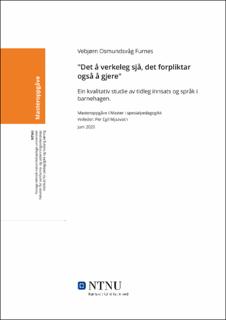| dc.contributor.advisor | Mjaavatn, Per Egil | |
| dc.contributor.author | Furnes, Vebjørn Osmundsvåg | |
| dc.date.accessioned | 2021-09-28T17:37:25Z | |
| dc.date.available | 2021-09-28T17:37:25Z | |
| dc.date.issued | 2020 | |
| dc.identifier | no.ntnu:inspera:53268456:36104935 | |
| dc.identifier.uri | https://hdl.handle.net/11250/2784655 | |
| dc.description.abstract | Denne studien hadde som hensikt å undersøkje korleis pedagogiske leiarar forstår og legg til rette for tidleg innsats med vekt på barns språkutvikling i barnehagen. Studien vart undersøkt ut i frå problemstillinga: «Korleis forstår og legg pedagogiske leiarar til rette for tidleg innsats med vekt på barns språkutvikling i barnehagen?». Oppgåva har eit kvalitativt forskingsdesign med kvalitative forskingsintervju som metode. For å undersøkje problemstillinga vart det utført intervju med tre pedagogiske leiarar på storbarnsavdelingar med ulik bakgrunn og erfaring. Funna blir presentert og drøfta ut i frå dei tre kategoriane tidleg innsats, barnehagens språkmiljø og samarbeid.
Hovudfunna i oppgåva viser til ein einigheit blant dei pedagogiske leiarane om korleis omgrepet tidleg innsats skal bli forstått. Det kjem likevel fram at omgrepets bruk i praksis er diskuterbart. Dei peikar på variasjonar i korleis ulike barnehagepersonell tolkar omgrepet og at det er noko ein i fellesskap må bli einige om på arbeidsplassen. Dette kan tyde på at det er behov for eit felles rammeverk for tidleg innsats i norske barnehagar. For barnehagens språkmiljø fann eg at dei pedagogiske leiarane er opptekne av vaksenrolla og samspel med barna for språkutviklinga, og eit godt samarbeid innanfor personalgruppa. Vidare peika dei på viktigheita av organisering i barnehagekvardagen, nytte kvardagssituasjonane til språkstimulering og observasjon og kartlegging i det daglege arbeidet. I samarbeidet med foreldre fann eg at pedagogane ynskjer eit tett, nært og ope samarbeid med foreldre. Dei peika på viktigheita av å få foreldra på lag då parallelt arbeid i barnehagen og heimen kan ha ein positiv effekt for barnets utvikling. I overgangen frå barnehagen til skulen viser dei pedagogiske leiarane til ei oppfatning av barnehagen som avgjerande for tidleg innsats i skulen. Pedagogane viser til informasjonsutveksling som kan gjere at barna får den støtta dei treng frå dag ein, men at det også finnes utfordringar ved dette samarbeidet når informasjonen ikkje blir overført eller nytta. Av vidare forsking på feltet kan det vere hensiktsmessig med eit fokus på å finne ein felles ramme for tidleg innsats knytt til norsk barnehagetradisjon. Elles vidare forsking på tidleg innsats og språk for dei minoritetsspråklege barna, og korleis ta vare på tidleg innsats i overgangen frå barnehage til skule. | |
| dc.description.abstract | The purpose of this study was to examine how kindergarten teachers understand and facilitate early intervention with focus on children's language development. The study wanted to explore the research question: «How do kindergarten teachers understand and facilitate early intervention with an emphasis of children’s language development?». The thesis uses a qualitative research design and qualitative semi-structured interviews as the methodological approach. The empirical material was gathered through interviews with three kindergarten teachers with different backgrounds and experiences. Furthermore, the findings are presented and discussed based on the three categories; early intervention, the language environment in the kindergartens, and lastly collaboration.
The key findings show that the three kindergarten teachers agree on how they understand the term early intervention. However, the use of the term in practice is more unclear. My informants showcase the variety in the interpretation of the term, and further how the employees of the individual kindergarten have to come to an agreement of how they interpret the term. These findings suggest that there is a need for a common understanding of the term based on the Norwegian kindergarten tradition. I found that the kindergarten teachers were interested in the profession role of the adults in interactions with the children, and the cooperation between the staff members. Furthermore, they illustrate the importance of organizing the day, use of the natural settings that happens every day in kindergarten, and observation in their daily work for a sufficient language environment. When collaborating with parents the kindergarten teachers explain that they want to facilitate a close and open relation. They emphasize the importance of cooperating with the parents to increase the benefits of actions when they are practiced both at home and in the kindergarten. My findings related to the transition from kindergarten to school showcase an impression that the kindergarten plays a vital role for early intervention. Exchanging information that has been acquired about the children in kindergarten may lay the groundwork for children getting the support they need from early on at school, though there are challenges in this collaboration if the information is not transferred or utilized. It appears desirable that future research focus on developing a common framework for early intervention in the context of the Norwegian kindergarten tradition. Otherwise, further research on early intervention related to minority children and their language development is also an interesting subject, in addition to how one can maintain early intervention in the transition from kindergarten to school. | |
| dc.language | nno | |
| dc.publisher | NTNU | |
| dc.title | Det å verkeleg sjå, det forpliktar også å gjere | |
| dc.type | Master thesis | |
